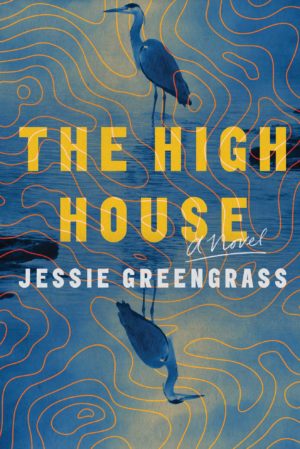The High House
by Jessie Greengrass
reviewed by Csilla Toldy
“You think you have time. And then, all at once, you don’t.” So writes Jessie Greengrass in her disturbing, beautiful new novel, The High House, which was shortlisted for the 2021 Costa Novel Award and the 2022 Encore Award of The Royal Society of Literature, and the 2022 Orwell Prize for Political Fiction. (The winner of the Orwell Prize, Small Things Like These by Claire Keegan, was recently announced.)
This book is set in the near future, but we don’t know how near that future is. All we know is that, given the rising sea levels brought on by climate change, any island country could be engulfed by the ocean within a matter of decades—a story that may well become reality for the next generation of readers. Greengrass writes:
Somehow, while we had all been busy, while we had been doing those small things which added up to living, the future had slipped into the present—and despite the fact that we have known that it would come, the overwhelming feeling, now that it was there, was of surprise, like waking one morning to find that you had been young, and now, all at once, you weren’t.
How will they adapt? How can humans learn to live together in a world where it’s no longer social status—acquired through heritage or wealth—that rules, but rather survival, which depends on having a piece of land you can grow your own food on, one that’s high enough and not covered by seawater?
At a recent talk organized by the Institute of Advanced Studies at the University College London, Jessie Greengrass said that she does not have solutions. The High House is, instead, a thought experiment. Her narrative goes much further than a dystopian novel, however, not just world-building but also analyzing the inner and interpersonal dynamics necessary for survival if human beings want to coexist.
The story is told by three young people: Caro, her half-brother Pauly, and Sally. Caro becomes her brother’s caretaker by default, for Pauly’s mother, Francesca, and Caro’s father are scientists on a mission to warn the world about the impending climate catastrophe. They travel the world visiting conferences, and this is how they meet their death in America in a storm on the West Coast.
Per her last telephone conversation with her father, Caro takes Pauly to the eponymous high house near the sea, where she’s spent her childhood summers. Grief-stricken, she arrives to find two people she’s never met occupying the place. Strangely enough for Caro, they are expecting them. Francesca has prepared the place for Caro and Pauly’s survival, inviting Grandy, an old man, and his granddaughter, Sally, to teach her children the basic techniques of agriculture. The place has an orchard and a tide pool that generates electricity for the house.
I stayed for a long time, staring at them—the boxes of felt-tip pens, the reams of paper, chalks, playing cards, boxes of Lego—and in the silent barn I felt love come off the shelves like heat. I felt Francesca, planning, all through the autumn and the winter, while I thought she had abandoned us.
The four learn to live together. Pauly’s joy in encountering nature is juxtaposed with Caro’s grief and Sally’s practicality. Jealousy, resentment, and abandonment issues all surface in the minds of the women, but they learn to put all that aside. The three young people learn the harshness of survival—cold winters, hunger, working all day cultivating the land, saving electricity, holding on to anything that might be used in the future (be it waste or leftover packaging), rationing food and medication, and looking after your body to avoid any injuries that would require antibiotics.
Is there a future for humanity? Grandy, who has seen a lot in his life, has this to say when discussing it with Sally, in dialogue fractured by line breaks and em dashes:
—I don’t know what to think about Francesca,
he said.
—She is right that what might come now will not be like what has gone before, but I am an old man, and I have seen worlds end myself. I have seen the end of this village for a start.
—It’s not ended,
I said.
—We still live here.
—Changed, then,
Grandy said.
—I have seen it change past recognition.
—Francesca thinks,
I said,
—that what is different is that this time there will be no afterwards.
Grandy snorted.
—If she thinks that, then what’s she doing at the high house? She knows there’ll be something left. A ruined living, maybe, and a hard world, but hasn’t it always been that for most? All I can think is that what’s different now is that no one can claim this is progress.
The narrative culminates in the arrival of the floods, an event that brings the central dilemma of the novel to the fore: whether to save yourself or to warn others. Sally and Caro, instructed by Grandy, toll the church bell all night, giving in, even if in vain, to the ethical responsibility. Against all its foreboding, this is a deeply moral book, raising questions far beyond mere environmental issues.
Published on August 2, 2022

